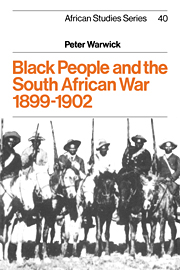Book contents
1 - Myth of a white man's war
Published online by Cambridge University Press: 21 September 2009
Summary
At the beginning of the South African War the British and the Boers seemed in agreement on one issue at least: that the ensuing struggle would be a ‘white man's war’ in which the involvement of black people in the fighting would be confined to non-combatant roles. Until recently it had been generally assumed by historians that the shape this tacit agreement imposed on military operations was maintained throughout the course of the war. Rayne Kruger, in his book Good-Bye Dolly Gray (1959), described ‘a phenomenon, so singular and astonishing, of a war fought across the breadth of a vast region, the majority of whose inhabitants were mere spectators’. Writing of the war in the Oxford History of South Africa (1971), Leonard Thompson concluded that ‘By tacit agreement both sides … refrained from involving the African peoples in their fighting, except as unarmed servants and scouts and, on the British side, as guards. Bitterly though the war was fought, it was a “white man's war”.’
Yet throughout the campaign allegations were persistently made that the opposing army was employing substantial numbers of black people as active participants in the war. In February 1900 General Sir Redvers Buller was informed by one of his officers in Natal that ‘most men at the front are aware that there are armed natives fighting with the Boers’.
- Type
- Chapter
- Information
- Black People and the South African War 1899–1902 , pp. 6 - 27Publisher: Cambridge University PressPrint publication year: 1983
- 1
- Cited by



